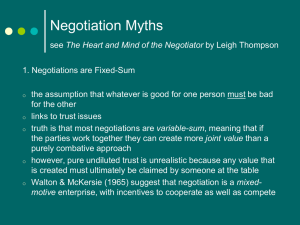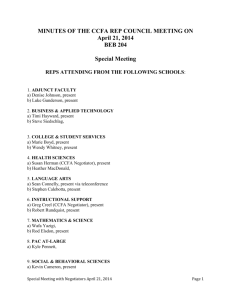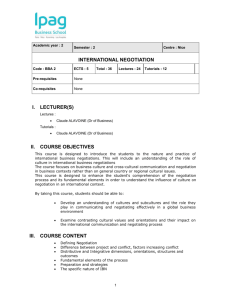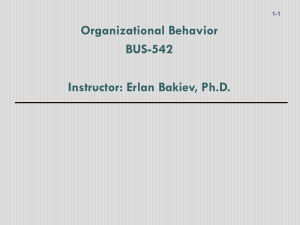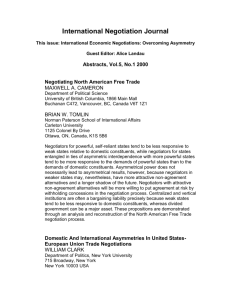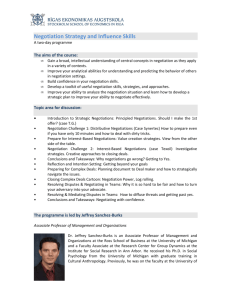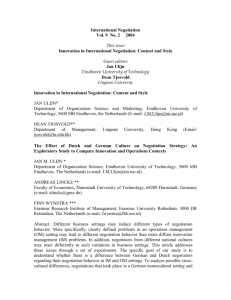to the full article
advertisement
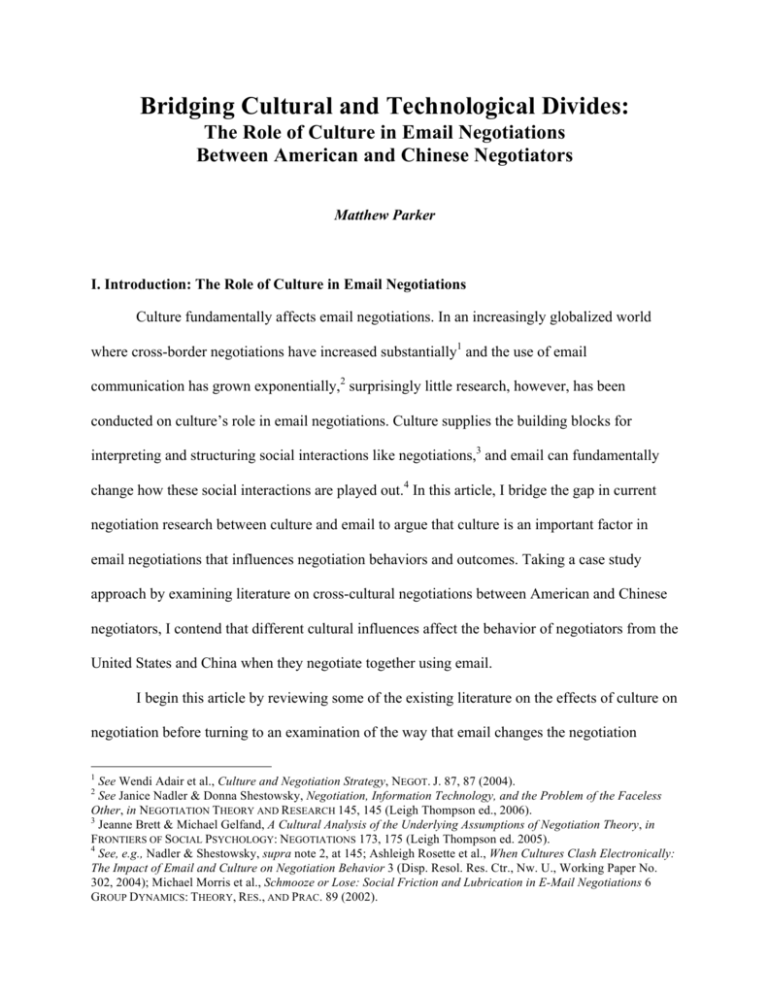
Bridging Cultural and Technological Divides: The Role of Culture in Email Negotiations Between American and Chinese Negotiators Matthew Parker I. Introduction: The Role of Culture in Email Negotiations Culture fundamentally affects email negotiations. In an increasingly globalized world where cross-border negotiations have increased substantially1 and the use of email communication has grown exponentially,2 surprisingly little research, however, has been conducted on culture’s role in email negotiations. Culture supplies the building blocks for interpreting and structuring social interactions like negotiations,3 and email can fundamentally change how these social interactions are played out.4 In this article, I bridge the gap in current negotiation research between culture and email to argue that culture is an important factor in email negotiations that influences negotiation behaviors and outcomes. Taking a case study approach by examining literature on cross-cultural negotiations between American and Chinese negotiators, I contend that different cultural influences affect the behavior of negotiators from the United States and China when they negotiate together using email. I begin this article by reviewing some of the existing literature on the effects of culture on negotiation before turning to an examination of the way that email changes the negotiation 1 See Wendi Adair et al., Culture and Negotiation Strategy, NEGOT. J. 87, 87 (2004). See Janice Nadler & Donna Shestowsky, Negotiation, Information Technology, and the Problem of the Faceless Other, in NEGOTIATION THEORY AND RESEARCH 145, 145 (Leigh Thompson ed., 2006). 3 Jeanne Brett & Michael Gelfand, A Cultural Analysis of the Underlying Assumptions of Negotiation Theory, in FRONTIERS OF SOCIAL PSYCHOLOGY: NEGOTIATIONS 173, 175 (Leigh Thompson ed. 2005). 4 See, e.g., Nadler & Shestowsky, supra note 2, at 145; Ashleigh Rosette et al., When Cultures Clash Electronically: The Impact of Email and Culture on Negotiation Behavior 3 (Disp. Resol. Res. Ctr., Nw. U., Working Paper No. 302, 2004); Michael Morris et al., Schmooze or Lose: Social Friction and Lubrication in E-Mail Negotiations 6 GROUP DYNAMICS: THEORY, RES., AND PRAC. 89 (2002). 2 dynamic. Combining research on email negotiations with literature on the role of culture in the negotiation process, I show that culture affects email negotiations. I then conclude by summarizing my findings and suggesting avenues for further research into the dynamic interplay between culture, email and negotiation. II. Culture and Negotiation: A Review of the Impact of Culture on American and Chinese Negotiators The way people understand and act during a negotiation reflects fundamental cultural assumptions varying along numerous cultural dimensions that are explored in this section of the paper.5 While it is certainly true that there is substantial variation in negotiation behaviors, norms, values and beliefs within a culture, there is a greater and sometimes even dramatic variation between cultures.6 The most significant cultural differences among American and Chinese negotiators occur along the individualism-collectivism, high-low power distance and high-low context dimensions.7 Each of these differences warrants further discussion because they have a significant impact on the way American and Chinese negotiators negotiate. a. The Individualism-Collectivism Dimension American culture is often characterized as individualist whereas Chinese culture is seen as more collectivist.8 In countries with highly individualist cultures like the United States, people are more likely to consider themselves as independent of the social group and thus more free to focus on personal goals.9 As a result, American negotiators generally rely more on analyticalrational thinking styles that focus on the problem, and use tactics such as argumentation based on 5 Brett & Gelfand, supra note 3, at 175. Jeanne Brett et al., Culture and Joint Gains in Negotiation, 14 NEGOT. J. 61, 79 (1998). 7 Wendy Adair & Jeanne Brett, Culture and Negotiation Process, in THE HANDBOOK OF NEGOTIATION AND CULTURE 158, 161 (Michele Gelfand & Jeanne Brett eds., 2004); E. Alan Buttery & T.K.P. Leung, The Difference Between Chinese and Western Negotiations, 32 EUR. J. MARKET. 374, 375-77 (1998). 8 Brett et al., supra note 6, at 65-67. 9 Adair & Brett, supra note 3, at 160. 6 1. logic and the presentation of facts.10 In contrast, negotiators from countries with more collectivist cultures like China rely more on intuitive-experiential thinking styles and use tactics that appeal to emotions, social obligations, and the desire to maintain harmony and save face.11 Consequently, Chinese negotiators are more likely to think about negotiation in terms of relationships whereas American negotiators are generally more focused on outcome.12 New research, however, suggests that these characterizations about individualist and collectivist negotiation styles may be too simplistic and that collectivists may actually act more aggressively to out-group members (i.e. people who are not a part of their collective).13 Researchers posit that when negotiating with strangers outside their culture, negotiators from collectivist cultures may no longer feel constrained by a concern for others and are thus more likely to reveal their egotistical sides.14 It is thus clear that the individualism-collectivism dimension affects how negotiators negotiate, suggesting for our purposes that this cultural dimension has implications for American-Chinese email negotiations. b. The High-Low Power Distance Dimension: The way that power is perceived and used in negotiations differs in countries with egalitarian cultures like the United States when compared to countries with more hierarchal cultures like China.15 In countries like the United States, social status differences exists but are 10 Gregory Kersten et al., The Effects of Culture in Anonymous Negotiations: Experiment in Four Countries, in PROCEEDINGS OF THE 35TH HAWAII INTERNATIONAL CONFERENCE ON SYSTEMS SCIENCE 418, 421 (2002). 11 Gelfand & Dyer, A Cultural Perspective on Negotiation: Progress, Pitfalls, and Prospects, 49 APP. PSYCHOL.: INT’L REV. 62, 81 (2000); Adair & Brett, supra note 7, at 159-60. 12 See Adair & Brett, supra note 7, at 160-61. 13 Xiao-Ping Chen & Shu Li, Cross-National Differences in Cooperative Decision-Making in Mixed-Motive Business Contexts: The Mediating Effect of Vertical and Horizontal Individualism, 36 J. INT’L BUS. STUD. 622, 624 (2005); at 624; Rosette et al., supra note 4, at 8. 14 Chen & Li, supra note 13, at 624 (discussing a series of studies conducted by researcher Toshio Yamagishi). 15 CLAUDE CELLICH & SUBHASH JAIN, GLOBAL BUSINESS NEGOTIATIONS: A PRACTICAL GUIDE 24, 33-34 (2004); Hong Seng Woo & Celine Prud’homme, Cultural Characteristics Prevalent in the Chinese Negotiation Process, 99 EUR. BUS. REV. 313, 317 (1999); Brett et al., supra note 6, at 63. 2. considered less important because power is considered more equal.16 In contrast, in more hierarchal countries like China, social status implies power and lower-status individuals are expected to be more willing to concede while higher-status individuals will generally take responsibility for the lower status individual’s needs.17 As a result, social roles have a greater impact on outcomes in higher power distance cultures.18 Given China’s and the United States’ different positions along the high-low power distance dimension, it is thus likely that power dynamics affect email negotiations between negotiators from the two countries. c. The High-Low Context Dimension: Unstated contextual information surrounding the explicitly transmitted message is of greater importance in countries with high context cultures like China when compared to more low context cultures like the United States.19 American negotiators usually transmit messages explicitly and focus on facts, reasons, actions and solutions.20 As a result, information sharing usually occurs through questions and answers, and discussions about mutual interests.21 This stands in contrast to countries with high context cultures like China where direct information sharing is less common and negotiators are expected to gather information from proposals and contextual factors including the physical environment, social status, and the nonverbal aspects of communication.22 Information is still shared by Chinese negotiators, but the exchange is generally more implicit and relies more on nonverbal cues and emotional appeal.23 Chinese negotiators are less likely to express conflict in a direct way, reject a request, or turn down an offer outright because indirectness is seen as important to maintaining harmony and saving 16 Cellich & Jain, supra note 15, at 34; Kersten et al., supra note 10, at 419. Woo & Prud’homme, supra note 15, at 317; Brett et al., supra note 6, at 63. 18 See Gelfand & Dyer, supra note 11, at 73-74. 19 Cellich & Jain, supra note 15, at 33; Brett et al., supra note 6, at 64. 20 Brett & Gelfand, supra note 3, at 177-79; Brett et al., supra note 6, at 64. 21 Adair et al., supra note 1, at 89. 22 Id.; Brett & Gelfand, supra note 3, at 188; Kersten et al., supra note 10, at 419. 23 See Buttery & Leung, supra note 7, at 375. 17 3. face.24 American negotiators, on the other hand, are generally more clear and direct about their interests and place less emphasis on the other party’s perspective.25 Particularly in the contextdeprived domain of email negotiation, American negotiators’ low context approach and Chinese negotiators’ high context style can create difficulties, a topic I examine in the next section of this article where I integrate the information learned about culture in this section with research on email negotiation to suggest that culture fundamentally affects email negotiations. III. Email Negotiation and Culture: Bridging the Research Divide Culture influences email negotiation behaviors and outcomes in four major domains that I explore in this section of the paper: interpersonal rapport, social contagion, coordination, and information.26 Research has shown that email negotiations affect each of these domains and I argue that cross-cultural email negotiations between American and Chinese negotiators in particular magnify these effects. Although sometimes contradictory, research on email negotiations shows that an email negotiation differs in many ways from a more traditional faceto-face negotiation and creates unique challenges and opportunities for negotiators.27 In this section, I discuss how email negotiation affects interpersonal rapport, social contagion, coordination, and information. Within each domain, I attempt to fill the current gap in research about culture’s role in email negotiations by applying the research on American and Chinese negotiation cultures to the research on email negotiations. I identify potential challenges and opportunities created by American-Chinese email negotiations and make suggestions for the effective use of email when negotiating cross-culturally. 24 Brett & Gelfand, supra note 3, at 192; Adair & Brett, supra note 7, at 173; Woo & Prud’homme, supra note 25, at 319. 25 Adair & Brett, supra note 7, at 177; Jeswald Salacuse, Ten Ways that Culture Affects Negotiation Style: Some Survey Results, 14 NEGOT. J. 221, 230 (2004). 26 These domains are adopted from Leigh Thompson & Janice Nadler, Negotiation via Information Technology: Theory and Application, 58 J. SOC. SCI. 109 (2002). 27 See Nadler & Shestowsky, supra note 2, at 147-49; Morris et al., supra note 4, 89. 4. a. Interpersonal Rapport in Email Negotiation A strong interpersonal rapport between negotiators (i.e. negotiators feel “in sync” with one another) is linked with more favorable outcomes for both parties.28 Compared to face-to-face negotiations where rapport is typically established through nonverbal cues like body language and gestures, email negotiation is generally more task-focused.29 For example, researchers in one negotiation study found that negotiators rated relationship as less important in email negotiations, which resulted in both sides perceiving their opponents as less credible.30 Other researchers have also found that email negotiations lead negotiators to be more competitive and risk-seeking.31 This is not to say, however, that interpersonal rapport cannot develop when using email. Rather, building relationships generally takes longer and requires more of a concentrated effort since physical cues are absent and negotiators must use other sources like message content to make judgments and establish rapport.32 The difficulty of establishing interpersonal rapport in email negotiations can pose challenges for American and Chinese negotiators. Because Chinese negotiators rely more heavily on context than their American counterparts for communicating and gathering information,33 negotiations using less informationally-rich media like email can be a barrier to reaching an agreement. As a result, it is important to try and establish a positive relationship immediately so that negotiators can build trust, a quality linked with greater information-sharing and more integrative agreements.34 In one study, for example, researchers found that email negotiators who had a brief telephone conversation before starting their negotiation reported greater rapport and 28 Thompson & Nadler, supra note 26, at 111. Id. at 111 & 115. 30 Maryalice Citera et al., An Experimental Study of Credibility in E-Negotiations, 22 PSYCHOL & MARKET. 163, 166 (2005). 31 Rosette et al., supra note 4, at 5. 32 Nadler & Shestowsky, supra note 2, at 156. 33 See, e.g., Brett & Gelfand, supra note 3, at 188. 34 See generally Thompson & Nadler, supra note 26, at 111. 29 5. trust.35 This would suggest that, if possible, American and Chinese negotiators should try and communicate first via phone or at least make an effort in their initial emails to get to better know one another in order to establish rapport. Negotiators must also be more cognizant of the implicit messages contained in emails,36 especially when people from low context cultures like the United States negotiate with people from high context cultures like China because they may be less attuned to understanding contextual clues in their communication.37 For example, while American negotiators using email will often make explicit statements to communicate messages that might be conveyed by expressions or actions in a face-to-face encounter,38 Chinese negotiators are more likely to feel constrained by social norms, particularly if the message to be conveyed may disrupt the social harmony.39 Interestingly, however, new research suggests that because social norms are less salient in email negotiations, people from collectivist cultures like China may actually be less cooperative and more aggressive about ensuring their individual interests are met.40 It is thus important that email negotiators be aware of implicit messages in their emails and ensure that each party’s interests are well-understood. Recognizing these contextual barriers to establishing rapport when using email negotiations thus poses challenges and opportunities for both American and Chinese negotiators. b. Social Contagion in Email Negotiation Closely related to interpersonal rapport, social contagion refers to the spread of affect, 35 Morris et al., supra note 4, at 99. See Nadler & Shestowsky, supra note 2, at 156. 37 See Cellich & Jain, supra note 15, at 33 (suggesting that in low context cultures information is transmitted more directly so people are less attune to other, non-direct information). 38 Morris et al., supra note 4, at 92. 39 See Rosette et al., supra note 4, at 7; Seng Woo & Prud’homme, supra note 15, at 19. 40 See generally Chen & Li, supra note 13 (finding that in a mixed-motive business negotiation between Chinese and Australian negotiators in which neither side faced any form of sanctions, Chinese negotiators were less cooperative and their decisions were often mediated by individual needs). 36 6. attitude or behavior from one negotiator to another where the affected negotiator does not perceive an intentional influence.41 While most research has focused on social contagion in faceto-face negotiation, some scholars have posited that email negotiators may also subconsciously imitate the linguistic structure of each other’s messages, the social-emotion connotations of the messages, and even the rate of emails responses in some cases.42 This can sometimes lead to positive outcomes;43 however, because negotiators may feel less restrained about using threats and ultimatums in email negotiations,44 the use of counterproductive techniques may subconsciously escalate to the point the negotiation breaks down.45 This effect has been observed particularly in negotiations between members of different groups,46 which some scholars posit is the result of the “sinister attribution error” (i.e. the tendency to attribute an opposing negotiator’s actions to malevolent motives if he or she is not a member of our group).47 Social contagion can thus have profound effects on negotiations between American and Chinese negotiators. Given that the negotiators are from different cultural groups, the chances for sinister attribution error are high.48 This probability of error is further exacerbated in the context of email communication where levels of trust are already low.49 Social contagion can thus have powerful negative effects on inter-cultural negotiations. The impacts of social contagion do not necessarily have to be negative, however. In a study on the effects of gender on email negotiations, for example, researchers found that because 41 Thompson & Nadler, supra note 26, at 113 (referencing David Levy & Paul Nail, Contagion: A Theoretical and Empirical Review and Reconceptualization, 20 GENETIC, SOC. & GEN. PSYCHOL. 267, 266 (1993)). 42 Id. at 113-14. 43 See, e.g., id. at 112-12. 44 Morris et al., supra note 4, at 93. 45 See Thompson & Nadler, supra note 26, at 119. 46 Id. 47 See id.; Roderick Kramer, Paranoid Cognition in Social Systems: Thinking and Acting in the Shadow of Doubt, 2 PERSONALITY & SOC. PSYCHOL. REV. 251, 262-63 (1998). 48 See Kramer, supra note 47, at 263. 49 See, e.g., Charles Naquin & Gaylen Paulson, Online Bargaining and Interpersonal Trust, 88 J. APP. PSYCHOL. 113, 116-17 (2003). 7. traditional status levels and roles were less salient in virtual negotiations, it promoted a sense of equality for negotiators, leading to less susceptibility by female negotiators to the social influence of the other negotiator, and more equitable outcomes overall.50 The findings suggest that in countries with cultures with a high power dynamic like China, email negotiations may help to break down social hierarchies that can impede information sharing and lead to distributive tactics.51 Consequently, American negotiators should promote equality and information sharing when negotiating with Chinese negotiators. In doing so, it also helps American negotiators to think more about Chinese negotiators’ interests and reduces the chances they will fall victim to the fixed pie bias, a bias more often observed among negotiators from individualist cultures because they are more likely to promote their own interests over those of others.52 Although social contagion can present many challenges for American and Chinese negotiators, it also creates many opportunities. c. Coordination in Email Negotiation In cross-cultural negotiation, coordination refers to the ability of negotiators to agree, implicitly or explicitly, to a course of action and outcome.53 Research shows that the communication medium adopted by negotiators significantly affects coordination.54 For example, in one study, researchers found higher levels of coordination with face-to-face communication than with written communication.55 That is not to say, however, that 50 Alice Stuhlmacher et al., Gender Differences in Virtual Negotiation: Theory and Research, 57 SEX ROLES 329, 330, 333 & 336-37 (2007). 51 See Brett et al., supra note 6, at 77 (finding that the hierarchal structure that dominates Chinese negotiations causes negotiators to share less information and to more often resort to distributive tactics). 52 Michele Gelfand & Sophia Christakopoulous, Culture and Negotiator Cognition: Judgment Accuracy and Negotiation Processes in Individualistic and Collectivist Cultures, 79 ORG. BEHAV. & HUM. DECISION PROCESSES 248, 263 (1999). 53 See Thompson & Nadler, supra note 26, at 111. 54 See, e.g., Kathleen Valley et al., How Communication Improves Efficiency in Bargaining Games, 38 GAMES & ECON. BEHAV. 127, 145-46 (2002). 55 Id. at 149. 8. communication must be face-to-face in order to have coordination and to reach a deal. Studies show that people negotiating through email can reach profitable deals, but often this takes more time56 and requires a strong relationship between negotiators so that they feel comfortable sharing information.57 For American and Chinese negotiators, coordination can thus pose unique challenges. Email negotiations can be particularly difficult for negotiators from countries like China who rely to a greater extent on context when negotiating because the lack of visual access, synchronicity and other contextual elements often results in less coordination.58 The fact that Chinese negotiators also communicate more implicitly, rarely rejecting a request or turning down an offer outright,59 can also be a source of frustration for American negotiators who are more reliant on explicit messages.60 Consequently, these barriers to coordination can make reaching a deal more difficult. American and Chinese negotiators can adapt to the constraints of email, however, and coordination is possible. Email negotiators may simply require more time to complete negotiations in order to better uncover underlying interests and build trust.61 Sharing information is key to achieving coordination.62 American negotiations in particular should thus be especially attentive to the implicit information-sharing in the emails they receive from their Chinese counterparts given that China’s high context culture often leads Chinese negotiators to rely more 56 Citera et al., supra note 30, at 172-73. Nadler & Shestowsky, supra note 2, at 157. 58 See Cellich & Jain, supra note 15, at 33.; Kathleen McGinn & Rachel Croson, What Do Communication Media Mean for Negotiators? A Question of Social Awareness, in THE HANDBOOK OF NEGOTIATION AND CULTURE 334, 242 (Michele Gelfand & Jeanne Brett eds., 2004); Kathleen McGinn & Angela Keros, Improvisation and the Logic of Exchange in Socially Embedded Transactions, 47 ADMIN. SCI. Q. 442, 447 (2002). 59 Seng Woo & Prud’homme, supra note 15, at 319. 60 Cellich & Jain, supra note 15, at 33. 61 See Jill Purdy et al., The Impact of Communication Media on Negotiation, 11 INT’L J. CONFLICT MGMT. 162, 167 (2000). 62 Thompson & Nadler, supra note 26, at 111. 57 9. on implicit messaging.63 This suggests that while there are coordination challenges for American and Chinese negotiators using email, coordination is possible with time and a shared sense of understanding and trust. d. Information in Email Negotiation Because information is exchanged less readily in email negotiations, it can pose unique problems for negotiators. Studies consistently show that less information is shared in email negotiations because of fundamental differences between verbal and written communication.64 For example, it is faster for a negotiator to say something than to write it down, and harder for him or her to ask brief clarifying questions in an email.65 While one benefit of email negotiation is that negotiators focus more on the content and quality of their argument, a drawback is that people are less attentive to the other party which makes establishing rapport – usually done through the exchange of emotions, feedback and questions – more difficult.66 Overcoming the informational gap can be especially difficult for American and Chinese negotiators. Both American negotiators (who often use questions to gather information)67 and Chinese negotiators (who more frequently rely on context for informational clues)68 struggle to find ways to exchange information when negotiating through email. As a result, they are also more likely to make assumptions about the other party.69 These difficulties associated with information exchange may also exacerbate the Chinese tendency to withhold information in the negotiation process.70 While there is no simple solution to address informational problems, the 63 Adair et al., supra note 1, at 89. Morris et al., supra note 4, at 91; Thompson & Nadler, supra note 26, at 112. 65 Id. 66 Nadler & Shestowsky, supra note 2, at 153; Morris et al., supra note 4, at 91. 67 Brett & Gelfand, supra note 3, at 187. 68 Brett et al., supra note 6, at 64. 69 See Thompson & Nadler, supra note 41, at 117. 70 See Michael Miles, Negotiation with the Chinese: Lessons from the Field, 39 J. APP. BEHAV. SCI. 453, 462 (2003). 64 10. stronger the relationship between the negotiators, the more likely they are to share information.71 Avoiding assumptions and asking clarifying questions is an important step to help diminish the information gap.72 Research has also found that being more explicit can help to address certain informational problems.73 It is thus important that American and Chinese negotiators establish a positive rapport so that Chinese negotiators will feel more comfortable being explicit in their messages. Being aware of some of the common cultural tendencies of American and Chinese negotiators can help both to negotiate better by increasing information sharing. IV. Tentative Conclusions and Future Directions: What We Know (and Want to Know) About the Role of Culture in Email Negotiations Culture fundamentally affects the email negotiation behaviors and outcomes of American and Chinese negotiators, presenting both challenges and opportunities. With the boom of the Internet and international trade, the need to understand how culture affects email negotiations has never been more apparent. The larger cultural and situational context in which negotiators are embedded affects the negotiation process. As we have seen, culture is reflected in the behavioral patterns, norms, values, and beliefs of negotiators. These cultural attributes are not only apparent in face-to-face negotiations, but can be seen in email negotiations as well. As I have argued, culture is an important factor in email negotiations that influences negotiator behaviors and negotiation outcomes. Although my attempt to bridge the divide in research on the effect of email communication in negotiations with research on the relationship between culture and negotiation has answered some questions, it has also raised many others. Future research would benefit from more systematically examining the relationship between culture and email negotiation through studies and simulations. Research into the types of cross- 71 Nadler & Shestowsky, supra note 2, at 157. Thompson & Nadler, supra note 41, at 117. 73 Nadler & Shestowsky, supra note 2, at 156. 72 11. cultural negotiations that are better suited for email would also be of benefit. Finally, more research into the role of email negotiations in other cultures would contribute to the field. As the world continues to globalize, a better understanding of the interplay between culture, email and negotiation is needed because, as this paper has demonstrated, culture plays an important role in email negotiations and can lead to many challenges, but also many opportunities. 12.
